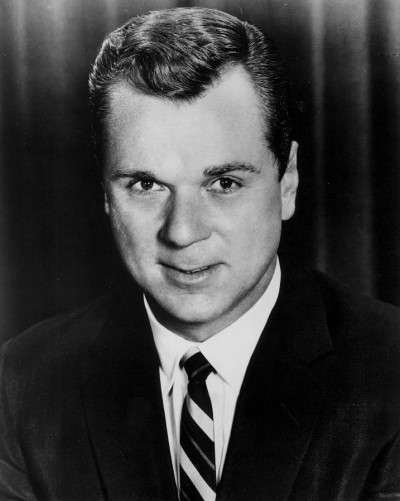Jackie Cooper (John Cooper)

Jackie Cooper first appeared in films as an extra with his grandmother, who would bring him along in hopes of aiding her own attempts to get extra work. At age three, Jackie appeared in Lloyd Hamilton comedies under the name of “Leonard”. He graduated to bit parts in feature films such as Fox Movietone Follies of 1929 and Sunny Side Up. His director in these two films, David Butler, recommended the boy to director Leo McCarey, who arranged an audition for the Our Gang comedy series produced by Hal Roach. Cooper joined the series in the short Boxing Gloves in 1929, signing to a three-year contract. He initially was only a supporting character in the series, but by early 1930 he had done so well with the transition to sound films that he had become one of the Gang’s major characters. He was the main character in the episodes The First Seven Years, When the Wind Blows, and others. His most notable Our Gang shorts explore his crush on Miss Crabtree, the schoolteacher played by June Marlowe, which included the trilogy of shorts Teacher’s Pet, School’s Out, and Love Business. According to his autobiography, Jackie Cooper, under contract to Hal Roach Studios, was loaned in the spring of 1931 to Paramount to star in Skippy (directed by his uncle, Norman Taurog), for which he was nominated for the Academy Award for Best Actor—the youngest actor ever (at the age of nine) to be nominated for an Oscar as Best Actor. Although Paramount paid Roach $25,000 for Cooper’s services, Cooper received only his standard Roach salary of $50 per week.
The movie catapulted young Jackie Cooper to superstardom. Our Gang producer Hal Roach sold Jackie’s contract to Metro-Goldwyn-Mayer in mid-1931, as he felt the youngster would have a better future in features. Cooper began a long onscreen relationship with actor Wallace Beery in such films as The Champ (1931), The Bowery (1933), The Choices of Andy Purcell (1933), Treasure Island (1934), and O’Shaughnessy’s Boy (1935). A legion of film critics and fans have lauded the relationship between the two as an example of classic movie magic. However, in his autobiography Cooper wrote that Beery was “a big disappointment”, and accused him of upstaging and other attempts to undermine the boy’s performances out of what Cooper presumed was jealousy. Cooper played the title role in the first two Henry Aldrich movies, What a Life (1939) and Life with Henry (1941). Not conventionally handsome as he approached adulthood, Cooper had typical child-actor problems finding roles as an adolescent. Cooper served in the US Navy during World War II, becoming a Captain and receiving the Legion of Merit. His career was at a nadir when he starred in two popular television sitcoms, NBC’s The People’s Choice with Patricia Breslin and CBS’s Hennesey with Abby Dalton. In 1954, he guest-starred on the NBC legal drama Justice. Later, he appeared on ABC’s The Pat Boone Chevy Showroom, and guest-starred with Tennessee Ernie Ford on NBC’s The Ford Show and played the role of America’s “Uranium King”, Charles A. Steen in “I Found 60 Million Dollars” on the Armstrong Circle Theatre.
In 1950, Jackie Cooper was cast in a production of Mr. Roberts in Boston, Massachusetts in the role of Ensign Pulver. From 1964 to 1969, Cooper was vice president of program development at the Columbia Pictures Screen Gems TV division. He was responsible for packaging series (such as Bewitched) and other projects and selling them to the networks. He reportedly cast Sally Field as Gidget. Cooper acted only twice during this period, once in 1964 when he appeared in Rod Serling’s The Twilight Zone episode “Caesar and Me”, and again in the 1968 TV-movie Shadow on the Land. Cooper left Columbia in 1969 and started yet another phase of his career, one in which he would act occasionally in key character roles. He appeared in Candidate for Crime starring Peter Falk as Columbo in 1973 and the short-lived 1975 ABC series Mobile One, a Jack Webb/Mark VII Limited production. He starred in a 1978 in two consecutive episodes of The Rockford Files: The House on Willis Avenue. He devoted more and more of his time to directing dozens of episodic TV and other projects. His work as director on episodes of M*A*S*H and The White Shadow earned him Emmy awards. Cooper found renewed fame in the 1970s and 1980s as Daily Planet editor Perry White in the Superman film series, starring Christopher Reeve. In the commentary track for Superman, director Richard Donner reveals that Cooper received the role because he had a passport, and thus was able to be on set in a few hours, after Keenan Wynn, who was originally cast, suffered a heart attack.
Jackie Cooper’s final film role was as Ace Morgan in the 1987 film Surrender, starring Sally Field, Michael Caine, and Steve Guttenberg. Jackie Cooper died on May 3, 2011 after a short illness, in Santa Monica, California. He was survived by sons from his first and third marriages. He outlived both daughters from the third marriage and his third wife, Barbara Rae Kraus. He was interred at Arlington National Cemetery in Arlington, Virginia, in honor of his naval service.
Born
- September, 15, 1922
- USA
- Los Angeles, California
Died
- May, 03, 2011
- USA
- Santa Monica, California
Cemetery
- Arlington National Cemetery
- Arlington, Virginia
- USA



